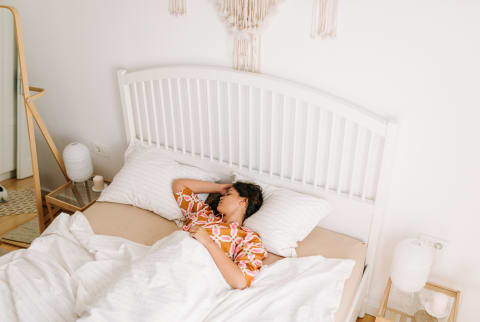Advertisement
This Is The One Time A Sleep Expert Says It's OK To Sleep In


If you ask clinical psychologist and board-certified sleep specialist Michael J. Breus, Ph.D., aka "the sleep doctor," the secret to getting good sleep, he'll tell you it all comes down to wake-up time. But even he is willing to bend the rules, for the right reason. Below, he shares the one time it's OK to sleep in later than normal.
Why a consistent wake-up time matters.
At a recent roundtable discussion, Breus joined chief medical officer at Sollis Health Ian Leber, M.D., and vice president at the Hästens Sleep Spa Tara Limoges, to talk about the science of good sleep. The biggest takeaway, according to Breus: "Wake up at the exact same time every single day, seven days a week."
The consistency helps set your circadian rhythm, which in turn supports quality sleep, healthy digestion, immune support, and "a lot of other good things," he says. (And no, he doesn't just talk the talk: Breus says he wakes up at 6:13 a.m. every single morning!)
When is it OK to sleep in later?
While it sounds simple enough in theory, we all have those nights we stay up a little later than planned—and that's where Breus is willing to bend his No. 1 sleep rule.
"You never want to get less than five hours of sleep. Period. End of story," he says. Less than five hours is when reaction time begins to slow, which can lead to accidents, particularly for those who drive, he explains.
So, whether your social plans keep you up or you're tossing and turning all night, make sure your total sleep time passes five hours. If it doesn't, consider this permission from the sleep doctor himself to hit snooze.
Bottom line.
When it comes to getting good sleep, maintaining consistency in your wake-up routine is essential—unless it means you're getting less than five hours of sleep. To help you get those restful hours, consider taking a high-quality sleep supplement, like mbg's sleep support+. The melatonin-free supplement supports a healthy circadian rhythm, by helping you fall asleep faster, stay asleep longer, and wake up feeling rejuvenated.*
